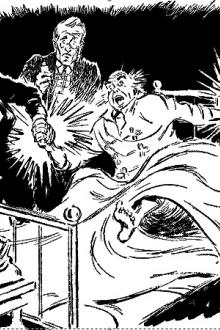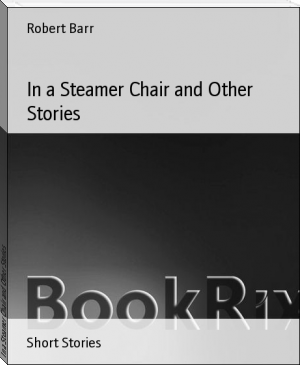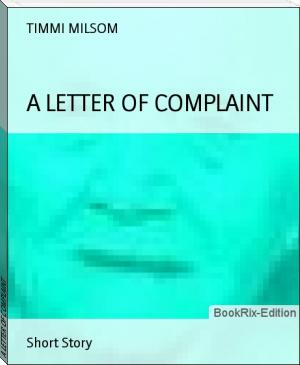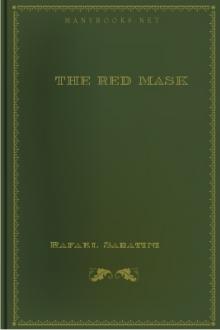The Face and the Mask - Robert Barr (comprehension books TXT) 📗

- Author: Robert Barr
Book online «The Face and the Mask - Robert Barr (comprehension books TXT) 📗». Author Robert Barr
"Everything is all right," he said to Bradley. "There will be no trouble, even if it was put up in a hurry, and in spite of the strain that will be on it to-day."
Bradley was not so sure of that, but he said nothing. When the foreman left him alone, he cautiously opened the lid of his tool chest and removed the carpenter's apron which covered something in the bottom. This something was a small box with a clockwork arrangement and a miniature uplifted hammer that hung like the sword of Damocles over a little copper cap. He threw the apron over it again, closed the lid of the chest, leaned against one of the timbers, folded his arms and waited.
Presently there was a tremendous cheer and the band struck up. "He is coming," said Bradley to himself, closing his lips tighter. "Carpenter," cried the policeman putting in his head through the little wooden door at the foot of the stage, "come here, quick. You can get a splendid sight of His Highness as he comes up the passage." Bradley walked to the opening and gazed at the distinguished procession coming toward him. Suddenly he grasped the arm of the policeman like a vice.
"Who is that man in the robes--at the head of the procession?"
"Don't you know? That is His Highness."
Bradley gasped for breath. He recognized His Highness as the man he had met on the embankment.
"Thank you," he said to the policeman, who looked at him curiously. Then he went under the grand stand among the beams and braces and leaned against one of the timbers with knitted brows.
After a few moments he stepped to his chest, pulled off the apron and carefully lifted out the machine. With a quick jerk he wrenched off the little hammer and flung it from him. The machinery inside whirred for a moment with a soft purr like a clock running down. He opened the box and shook out into his apron a substance like damp sawdust. He seemed puzzled for a moment what to do with it. Finally he took it out and scattered it along the grass-grown slope of a railway cutting. Then he returned to his tool chest, took out a chisel and grimly felt its edge with his thumb.
* * * * *
It was admitted on all hands that His Highness never made a better speech in his life than on the occasion of the opening of that exhibition. He touched lightly on the country's unexampled prosperity, of which the marvelous collection within those walls was an indication. He alluded to the general contentment that reigned among the classes to whose handiwork was due the splendid examples of human skill there exhibited. His Highness was thankful that peace and contentment reigned over the happy land and he hoped they would long continue so to reign. Then there were a good many light touches of humor in the discourse-- touches that are so pleasing when they come from people in high places. In fact, the chairman said at the club afterwards (confidentially, of course) that the man who wrote His Highness's speeches had in that case quite outdone himself.
* * * * *
The papers had very full accounts of the opening of the exhibition next morning, and perhaps because these graphic articles occupied so much space, there was so little room for the announcement about the man who committed suicide. The papers did not say where the body was found, except that it was near the exhibition buildings, and His Highness never knew that he made that excellent speech directly over the body of a dead man.
RINGAMY'S CONVERT.
Mr. Johnson Ringamy, the author, sat in his library gazing idly out of the window. The view was very pleasant, and the early morning sun brought out in strong relief the fresh greenness of the trees that now had on their early spring suits of foliage. Mr. Ringamy had been a busy man, but now, if he cared to take life easy, he might do so, for few books had had the tremendous success of his latest work. Mr. Ringamy was thinking about this, when the door opened, and a tall, intellectual-looking young man entered from the study that communicated with the library. He placed on the table the bunch of letters he had in his hand, and, drawing up a chair, opened a blank notebook that had, between the leaves, a lead pencil sharpened at both ends.
"Good morning, Mr. Scriver," said the author, also hitching up his chair towards the table. He sighed as he did so, for the fair spring prospect from the library window was much more attractive than the task of answering an extensive correspondence.
"Is there a large mail this morning, Scriver?"
"A good-sized one, sir. Many of them, however, are notes asking for your autograph."
"Enclose stamps, do they?"
"Most of them, sir; those that did not, I threw in the waste basket."
"Quite right. And as to the autographs you might write them this afternoon, if you have time."
"I have already done so, sir. I flatter myself that even your most intimate friend could not tell my version of your autograph from your own."
As he said this, the young man shoved towards the author a letter which he had written, and Mr. Ringamy looked at it critically.
"Very good, Scriver, very good indeed. In fact, if I were put in the witness-box I am not sure that I would be able to swear that this was not my signature. What's this you have said in the body of the letter about sentiment? Not making me write anything sentimental, I hope. Be careful, my boy, I don't want the newspapers to get hold of anything that they could turn into ridicule. They are too apt to do that sort of thing if they get half a chance."
"Oh, I think you will find that all right," said the young man; "still I thought it best to submit it to you before sending it off. You see the lady who writes has been getting up a 'Ringamy Club' in Kalamazoo, and she asks you to give her an autographic sentiment which they will cherish as the motto of the club. So I wrote the sentence, 'All classes of labor should have equal compensation.' If that won't do, I can easily change it.'
"Oh, that will do first rate--first rate."
"Of course it is awful rot, but I thought it would please the feminine mind."
"Awful what did you say, Mr. Scriver?"
"Well, slush--if that expresses it better. Of course, you don't believe any such nonsense."
Mr. Johnson Ringamy frowned as he looked at his secretary.
"I don't think I understand you," he said, at last.
"Well, look here, Mr. Ringamy, speaking now, not as a paid servant to his master, but----"
"Now, Scriver, I won't have any talk like that. There is no master or servant idea between us. There oughtn't to be between anybody. All men are free and equal."
"They are in theory, and in my eye, as I might say if I wanted to make it more expressive."
"Scriver, I cannot congratulate you on your expressive language, if I may call it so. But we are wandering from the argument. You were going to say that speaking as----Well, go on."
"I was going to say that, speaking as one reasonably sensible man to another, without any gammon about it; don't you think it is rank nonsense to hold that one class of labor should be as well compensated as another. Honestly now?"
The author sat back in his chair and gazed across the table at his secretary. Finally, he said:
"My dear Scriver, you can't really mean what you say. You know that I hold that all classes of labor should have exactly the same compensation. The miner, the blacksmith, the preacher, the postal clerk, the author, the publisher, the printer--yes, the man who sweeps out the office, or who polishes boots, should each share alike, if this world were what it should be--yes, and what it will be. Why, Scriver, you surely couldn't have read my book----"
"Read it? why, hang it, I wrote it."
"You wrote it? The deuce you did! I always thought I was the author of ----"
"So you are. But didn't I take it all down in shorthand, and didn't I whack it out on the type-writer, and didn't I go over the proof sheets with you. And yet you ask me if I have read it!"
"Oh, yes, quite right, I see what you mean. Well, if you paid as much attention to the arguments as you did to the mechanical production of the book, I should think you would not ask if I really meant what I said."
"Oh, I suppose you meant it all right enough--in a way--in theory, perhaps, but----"
"My dear sir, allow me to say that a theory which is not practical, is simply no theory at all. The great success of 'Gazing Upward,' has been due to the fact that it is an eminently practical work. The nationalization of everything is not a matter of theory. The ideas advocated in that book, can be seen at work at any time. Look at the Army, look at the Post Office."
"Oh, that's all right, looking at things in bulk. Let us come down to practical details. Detail is the real test of any scheme. Take this volume, 'Gazing Upward.' Now, may I ask how much this book has netted you up to date?"
"Oh, I don't know exactly. Somewhere in the neighborhood of L20,000."
"Very well then. Now let us look for a moment at the method by which that book was produced. You walked up and down this room with your hands behind your back, and dictated chapter after chapter, and I sat at this table taking it all down in shorthand. Then you went out and took the air while I industriously whacked it out on the type-writer."
"I wish you wouldn't say 'whacked,' Scriver. That's twice you've used it."
"All right:--typographical error--For 'whacked' read 'manipulated.' Then you looked over the type-written pages, and I erased and wrote in and finally got out a perfect copy. Now I worked as hard--probably harder--than you did, yet the success of that book was entirely due to you, and not to me. Therefore it is quite right that you should get L20,000 and that I should get two pounds a week. Come now, isn't it? Speaking as a man of common sense."
"Speaking exactly in that way I say no it is not





Comments (0)